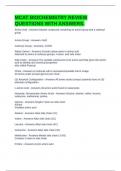MCAT BIOCHEMISTRY REVIEW
QUESTIONS WITH ANSWERS.
Amino Acid - Answers-Dipolar compound containing an amino group and a carboxyl
group
Amino Group - Answers--NH2
Carboxyl Group - Answers--COOH
Alpha Carbon - Answers-Central carbon atom in amino acid
Attached to amino & carboxyl groups, H atom, and side chain
Side Chain - Answers-The variable component of an amino acid that gives the amino
acid its identity and chemical properties
also called R-group
Chiral - Answers-A molecule with a nonsuperimposable mirror image
All amino acids (except glycine) are chiral
(S) Absolute Configuration - Answers-All amino acids (except cysteine) have an (S)
absolute configuration
L-amino Acid - Answers-All amino acids found in eukaryotes
Nonpolar, Nonaromatic Amino Acids - Answers-Glycine, alanine, valine, leucine,
isoleucine, methionine, proline
Glycine - Answers-Single H atom as side chain
Achiral
Smallest amino acid
Alanine - Answers-Alkyl side chain (1C)
Valine - Answers-Alkyl side chain (3C)
Leucine - Answers-Alkyl side chain (4C)
Isoleucine - Answers-Alkyl side chain (4C)
Methionine - Answers-Methyl side chain (-CH3)
Contains S atom in side chain
Proline - Answers-Cyclic amino acid
,N from amino group becomes part of side chain, forming five-part ring, limiting where is
can appear on a protein
Rigid/constraints on flexibility
Aromatic Amino Acids - Answers-Tryptophan, phenylalanine, tyrosine
Aromaticity - Answers-The ability of a molecule to delocalize pi electrons around a
conjucated ring, creating exceptional stability
Tryptophan - Answers-Double-ring system
Contains N atom in one ring
Largest of aromatic amino acids
Phenylalanine - Answers-Benzyl side chain (benzene ring + -CH2 group)
Smallest aromatic amino acid
Relatively nonpolar
Tyrosine - Answers-Phenylalanine + -OH group
Relatively polar
Polar Amino Acids - Answers-Serine, threonine, asparagine, glutamine, cysteine
Polarity - Answers-An uneven sharing of electrons in a molecule, creating a slightly
positive side and a slightly negative side
Serine - Answers--OH group in side chain
Highly polar - participate in H-bonding
Threonine - Answers--OH group in side chain
Highly polar - participate in H-bonding
Asparagine - Answers-Amide (-NH2) side chain
Amide N do not gain or lose protons with changes in pH - do not become charged
Glutamine - Answers-Amide (-NH2) side chain
Amide N do not gain or lose protons with changes in pH - do not become charged
Cysteine - Answers-Thiol (-SH) side chain - weaker than OH bond
Prone to oxidation
Negatively-charged (Acidic) Amino Acids - Answers-Aspartic acid (aspartate), glutamic
acid (glutamate)
Aspartic Acid (Aspartate) - Answers-Carboxylate (-COO(-)) group in side chain
Deprotonated form of asparagine
,Glutamic Acid (Glutamate) - Answers-Carboxylate (-COO(-)) group in side chain
Deprotonated form of glutamine
Positively-charged (Basic) Amino Acids - Answers-Lysine, arginine, histidine
Lysine - Answers-Terminal primary amino group
Arginine - Answers-Has 3 N atoms in side chain
Charge delocalized over all three N atoms
Histidine - Answers-Has aromatic ring with 2 N atoms (ring is called an imidazole)
At pH 7.4, one N is protonated and the other isn't
Under acidic conditions, the 2nd N becomes protonated, making it positively charged
Hydrophobic Amino Acids - Answers-Being repelled by water
Alanine, isoleucine, leucine, valine, phenylalanine
More likely to be found in center of protein
Nonpolar, uncharged compounds
Long alkyl chains
Hydrophilic Amino Acids - Answers-Being attracted to water
Histidine, arginine, lysine, glutamate, aspartate, asparagine, glutamine
Polar and charged compounds and those that participate in H-bonding
Neither Really Hydrophobic/-philic - Answers-Cysteine, threonine, serine, tyrosine,
tryptophan, proline, methionine, glycine
Amphoteric - Answers-Ability to act as an acid or a base
Can either accept or donate a proton
For ionizable groups: tend to be protonated at low pH; deprotonated at high pH
pKa - Answers-The pH at which half of the species are deprotonated
[HA] = [A(-)]
pKa1 - Answers-pKa for carboxyl group
Usually around 2
pKa2 - Answers-pKa for amino group
Usually between 9 and 10
pKa3 - Answers-For amino acids with ionizable side chains
Amino Acids in Acidic Conditions - Answers-Amino acid is fully protonated
i.e. (-NH3+) and (-COOH)
Amino Acids in Neutral Conditions - Answers-Form zwitterions
, pH is near pI of amino acid
i.e. (-COO(-)) and (-NH3(+))
Zwitterion - Answers-A molecule that contains charges, but is neutral overall
Amino Acids in Basic Conditions - Answers-Amino acid is fully deprotonated
i.e. (-COO(-)) and (-NH2)
Isoelectric Point (pI) - Answers-The pH at which every molecule in solution is electrically
neutral
Predominantly in zwitterion form
pI(neutral amino acid) = - Answers-(pKa(NH3+) + pKa(COOH))/2
For amino acids with neutral side chains
Have relatively neutral pI values (~6)
Buffer - Answers-When pH of a solution is approximately = pKa of solute
The pH doesn't change very much, even when acid or base are added to solution
pI(acidic amino acid) = - Answers-(pKa(R group) + pKa(COOH))/2
For amino acids with negatively charged side chains
Have relatively low pI values (~3.2)
pI(basic amino acid) = - Answers-(pKa(NH3+) + pKa(R group))/2
For amino acids with positively charged side chains
Have relatively high pI values (~9.75)
Titration - Answers-A laboratory technique in which a solution of unknown concentration
is mixed with a solution of known concentration to determine the unknown concentration
Titration Curves for Amino Acids - Answers-Curve is nearly flat at pKa values of amino
acids
Nearly vertical at pI of amino acid
Peptides - Answers-A molecule composed of more than one amino acid
Can be subdivided into dipeptides, tripeptides, oligopeptides, and polypeptides
Dipeptide - Answers-Two amino acid residues
Tripeptide - Answers-Three amino acid residues
Oligopeptide - Answers-Relatively small peptides (up to ~20 residues)
(Single amino acid does not count as oligopeptide)
Polypeptides - Answers-Long chains of residues (>20 residue)




